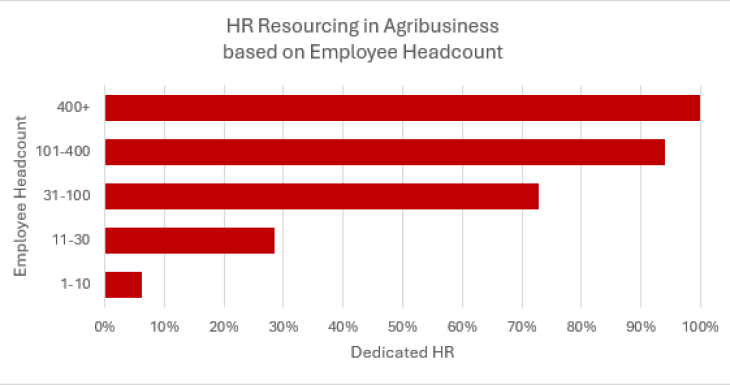General News
2 September, 2024
One in three agribusinesses' 'exposed' to new Labor industrial laws
Agribusinesses without HR "exposed" to IR laws starting Monday.

The more than 30 per cent of agribusinesses' lacking dedicated human resource professionals were "exposing themselves to risk" with Labor's new workplace laws coming into effect last week.
The impact will be felt most acutely by smaller businesses and family-owned farms, with the vast majority of enterprises without personnel managers having fewer than 100 employees on-board.
However, as the number of employees drops the risks taken by employers rise, with more than 70 per cent of agribusinesses' with 11 to 30 employees doing without HR and only around 5 per cent of organisations with one to 10 workers bothering to enlist a manpower manager.
Complex workplace regulations
Rimfire Resources employment analyst Jessica Roberts said, with consideration to the changing workforce regulatory environment in Australia, "these businesses might be exposing themselves to risk."
"The increasing complexity of workplace regulations in Australia could challenge organisations without dedicated HR resources," she said.
Farm leaders have previously raised concerns about "a straight-up union power grab" since the government's new workplace and industrial relations rules were flagged in 2022.
The reams of additional regulatory and compliance red tape that comes with Closing The Loopholes Part 2, that might be a blip for corporations with an office full of clerks, will also likely disproportionately impact farm businesses, the vast majority of which are family-operated.
The changes, which started on August 26, include new definitions to determine if workers are contractors or employees, changed definitions of casual employment, union right of entry powers and increased union delegates' rights, mandatory pathways to permanent employment and new minimum standards for gig economy truck drivers.
It will also include new legislative rights for employees to "disconnect" from phone contact with bosses outside normal working hours, however these will begin in August 2025 for small businesses.
Veteran economics and business writer Robert Gottliebsen said earlier this week that the 700 page Closing Loopholes legislation reform "bible" could also slash farmer productivity by promoting union intervention on farms employing 15 or more staff.
Meanwhile, the size of an organisation obviously plays a large part in the decision to employ a HR specialist.
A recent Rimfire Resources industry survey on workforce practices in agribusiness found in 2023-24 that large businesses with over 400 employees all employed staff with HR expertise, as did 94 per cent of organisations with an employee headcount between 100 and 400.
However, Ms Roberts said the results were more mixed among businesses with less than 100 employees, with the annual review finding 35 per cent rely on non-specialist staff for the human resource requirements, reflecting a steady pattern across the past six years.

She added that businesses would typically put on an internal HR resource once they hit about 50 employees.
"Below that headcount level, many organisations split their HR responsibilities among management, payroll and finance," she said.
"Agribusinesses may prioritise operational and production roles over HR functions, given the nature of the industry, with agricultural activities often taking precedence."
Alternatives to hiring an HR specialist in a standalone role while protecting the business from its workforce regulatory considerations include outsourcing to an external resource or implementing specialist HR systems and processes designed to fill the knowledge void.
Meanwhile, Mr Gottliebsen told the Farm Writers' Association of NSW annual media lunch that the farm sector and its consumers should brace themselves for a 10 per cent jump in food freight and agricultural input costs courtesy of the new rules.
"It's designed to bring conflict and disrupt productivity in every enterprise," he said.
He also said the legislation was a "facade focused on safety" set to stealthily empower unions, while also penalising the likes of "the small truckies responsible for their own trucks and family businesses".